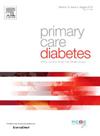Factors influencing the uptake of culturally tailored diabetes self-management education and support programmes among ethnic minority patients with type 2 diabetes: A systematic review
IF 2.6
4区 医学
Q3 ENDOCRINOLOGY & METABOLISM
引用次数: 0
Abstract
Purpose
This systematic review aimed to evaluate the factors influencing the uptake of culturally-tailored Diabetes Self-Management Education and Support (DSMES) programmes among ethnic minority patients diagnosed with type 2 diabetes mellitus (T2DM).
Methods
A systematic review, following PRISMA guidelines, was conducted, including quantitative research studies published in peer-reviewed journals from January 2013 to January 2023. Studies were extracted via the following databases, AMED, MEDLINE, CINAHL, EMBASE, EMCARE, PSYCHINFO, Ovid Nursing, and grey literature. Studies were selected based on eligibility criteria including the evaluation of DSMES programmes tailored for ethnic minorities and involving adult participants with T2DM. The factors affecting the uptake of these programs were mapped against the three categories of the Andersen's Behavioural Model of Health Services Use: predisposing, enabling, and need factors. The quality of the included studies was assessed using the Critical Appraisal Skills Program (CASP) checklist, and a narrative synthesis was conducted to analyse the findings.
Results
Nine studies met the inclusion criteria, demonstrating that culturally-tailored DSMES programmes significantly improve uptake among ethnic minorities. Key factors influencing participation included demographic characteristics, diabetes knowledge, emotional support, and cultural beliefs. Barriers such as language proficiency, cost, and diabetes fatalism were identified, while enablers included the use of local champions and culturally specific strategies.
Conclusions
This systematic review highlights the effectiveness of culturally-tailored DSMES programmes in improving health outcomes among ethnic minority groups. It suggests that more research is needed to explore these barriers and develop strategies to enhance the uptake of DSMES programmes among underserved populations.
影响少数民族2型糖尿病患者接受文化定制的糖尿病自我管理教育和支持计划的因素:一项系统综述
目的:本系统综述旨在评估影响少数民族2型糖尿病(T2DM)患者接受文化定制的糖尿病自我管理教育和支持(DSMES)计划的因素。方法:系统回顾2013年1月至2023年1月期间发表在同行评议期刊上的定量研究,遵循PRISMA指南。研究通过以下数据库提取:AMED、MEDLINE、CINAHL、EMBASE、EMCARE、PSYCHINFO、Ovid Nursing和灰色文献。研究的选择基于资格标准,包括为少数民族量身定制的DSMES项目的评估,并涉及患有2型糖尿病的成年参与者。根据安徒生的卫生服务使用行为模型的三类:易感因素、使能因素和需求因素,绘制了影响这些方案采用的因素。采用关键评估技能计划(CASP)检查表对纳入研究的质量进行评估,并进行叙述性综合分析以分析研究结果。结果:9项研究符合纳入标准,表明文化定制的DSMES计划显著提高了少数民族的吸收。影响参与的主要因素包括人口统计学特征、糖尿病知识、情感支持和文化信仰。确定了语言熟练程度、成本和糖尿病宿命论等障碍,而促成因素包括使用当地冠军和文化特定战略。结论:本系统综述强调了文化定制的DSMES计划在改善少数民族群体健康结果方面的有效性。它表明,需要更多的研究来探索这些障碍,并制定战略,以便在服务不足的人口中加强对DSMES方案的吸收。
本文章由计算机程序翻译,如有差异,请以英文原文为准。
求助全文
约1分钟内获得全文
求助全文
来源期刊

Primary Care Diabetes
ENDOCRINOLOGY & METABOLISM-PRIMARY HEALTH CARE
CiteScore
5.00
自引率
3.40%
发文量
134
审稿时长
47 days
期刊介绍:
The journal publishes original research articles and high quality reviews in the fields of clinical care, diabetes education, nutrition, health services, psychosocial research and epidemiology and other areas as far as is relevant for diabetology in a primary-care setting. The purpose of the journal is to encourage interdisciplinary research and discussion between all those who are involved in primary diabetes care on an international level. The Journal also publishes news and articles concerning the policies and activities of Primary Care Diabetes Europe and reflects the society''s aim of improving the care for people with diabetes mellitus within the primary-care setting.
 求助内容:
求助内容: 应助结果提醒方式:
应助结果提醒方式:


